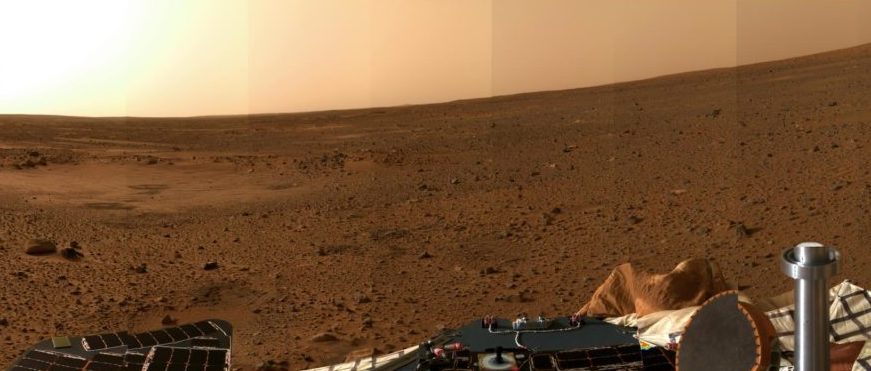Terra-farming: A possible step toward growing food on Mars
Scientists recently developed a substance that could help plants grow on Mars without the need for an artificial oxygen atmosphere
Jackie Appel • January 27, 2021

A panoramic photo of the surface of Mars taken by the Mars rover, Spirit. [Credit: NASA/JPL | CC0]
Even for plants, Mars’ atmosphere has too much carbon dioxide. During the transformation from seed to sprout, most plants need oxygen in the mix, and scientists have now developed a polymer — a substance made of very large molecules — to address this issue in the environment of the red planet.
Stephen Quirk, head biologist at Kimberly-Clark, and his team developed this substance to deliver oxygen to help plants survive the first phase of their lives, known as germination. During this phase, a plant relies entirely on its own nutrient stores, water and oxygen from the surrounding atmosphere and regolith, a term used for Martian soil. The combination of a Martian atmosphere made mostly of carbon dioxide and dusty regolith makes germination a difficult process.
“It’s like growing stuff in sand,” Quirk said. “And you have to create an oxygen environment. This [polymer] is another tool in the toolkit.” His team’s research was published in Astrobiology this past July.
The polymer delivers oxygen to the plants through the regolith, bypassing the need for an oxygen atmosphere like we have on Earth. The team added the foamed, dried and powdered polymer to the regolith in a 1-to-50 ratio for 75 cress seeds in pure carbon dioxide atmospheres and activated it with water, releasing the necessary oxygen to kickstart growth.
“When you think about what is most valuable, oxygen is pretty high on the list for space colonization,” said Penn State University geoscientist Christopher House, who was not involved in the study. “These authors have found a novel solution to getting seeds to germinate without using high amounts of oxygen.”
All 75 of the plants that received the oxygen-donating polymer germinated, whereas none of the 75 seeds without the polymer did.
Though these results are encouraging, the initial experiment only ran for 12 days. According to Quirk, the vacuum chambers housing the artificial carbon dioxide atmospheres in the lab prevented researchers from rehydrating the soil, leaving the plants to dry out before their full growth could be observed. Quirk said, however, that the team plans to design new experiments to further test the polymer’s capabilities.
“As soon as COVID lets us back in the laboratories, we’re contemplating working in a larger enclosure and having a container of deoxygenated water inside so we can run the experiments to five weeks, when the plant is fully mature,” Quirk said.
At this point, the team is hopeful that the polymer could help future colonists make other worlds more habitable for humans. House said it could be useful in many off-world agricultural situations that lack oxygen, from the Moon to an asteroid and beyond.
“The vision they’re having,” House said, “is that you would be, in a very high-tech way, controlling the land as you homestead across the solar system.”
6 Comments
Very interesting. Can’t wait to see what happens next.
The title lead “Terra-farming” is very appropriate, suggesting the the first step in “terra-forming” an alien planet to meet our survival requirements. I also appreciated that Quirk recognized the need for deoxygenated water for subsequent longer term experiments. This article was highly informative, succinct and self explanatory with regard to technical terms (polymer, regolith) and the germination process.
Keep up the good content :) love seeing stuff about Mars!
Great article! Well written and very informative!
This typical area of research is fascinating, please do upload more articles.
will yacka plants grow on mars